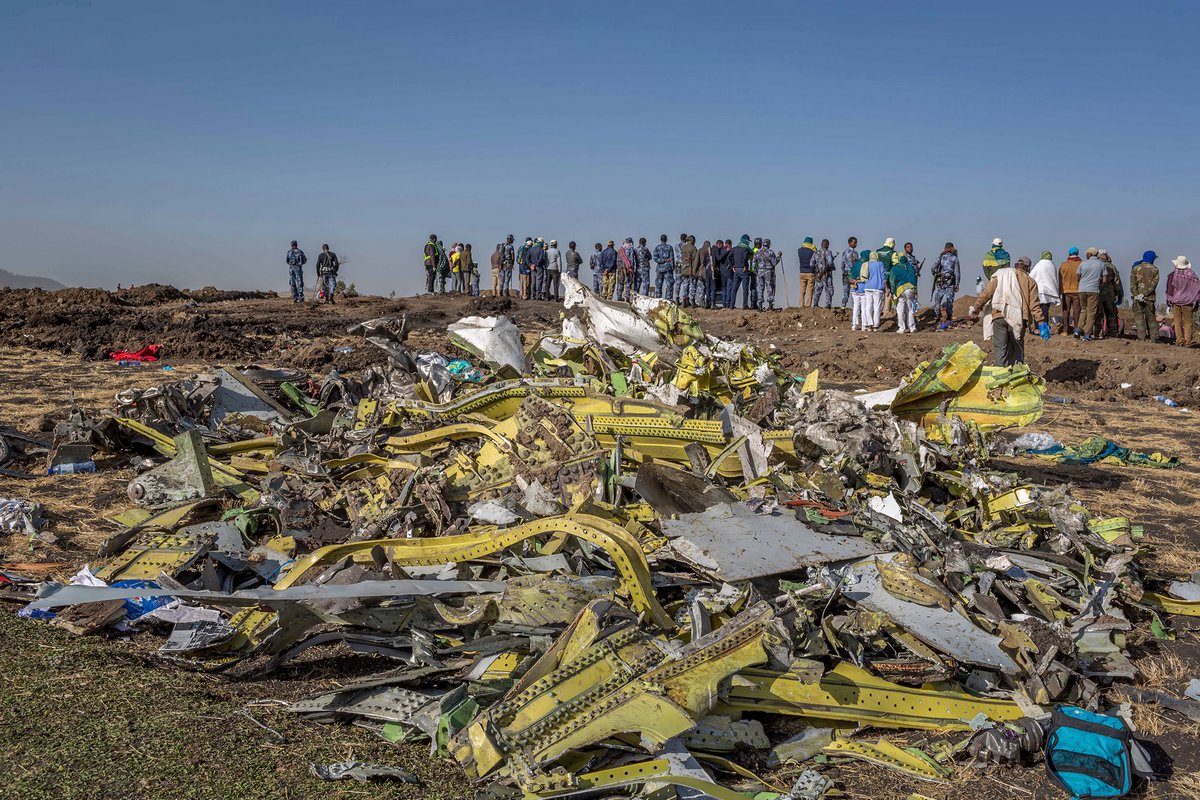The Ethiopian Airlines crew commanding the Boeing 737 Max 8, which crashed last month and killed all 157 people on board, followed all recommended procedures but couldn’t regain control of the doomed flight, Ethiopian investigators told reporters Thursday morning.
Ethiopian Transport Minister Dagmawit Moges said preliminary findings from an investigation into the deadly crash show the aircraft had a valid certificate of airworthiness, the pilots were licensed and qualified to conduct the flight, and the plane’s takeoff appeared to be “very normal.” As the jet began nose-diving, the pilots “repeatedly” performed all emergency procedures provided by Boeing, the manufacturer, but they “were not able to control the aircraft,” Moges told reporters at a press conference in Ethiopia’s capital, Addis Ababa.
Ethiopian Airlines Flight 302 went down in clear weather in the morning on March 10, six minutes after taking off from Addis Ababa Bole International Airport. The American-made jet, carrying 149 passengers and 8 crew members, was headed to Nairobi, Kenya.
Based on the initial report, Ethiopian safety investigators recommend Boeing reviews the aircraft flight control system of its new 737 Max 8 model and that avian authorities verify the flight controllability has been adequately addressed by the manufacturer before resuming operations of this jet, according to the transport minister.
The findings dispute reports of foreign object damage referred to as FOD by Ethiopian investigators.
“We did not find any information regarding the FOD (foreign object damage) on the aircraft,” Amdye Andualem, chairman of the Ethiopian Accident Investigation Bureau told reporters at Thursday’s press conference. “The data provided by the FDR (flight data recorder) doesn’t indicate that there is a FOD.”
Ethiopian Airlines Aviation Group CEO Tewolde GebreMariam acknowledged the preliminary report in a statement, saying he finds “clearly” show that the pilots followed instructions recommended by Boeing and approved by the United States Federal Aviation Administration.
“All of us at Ethiopian Airlines are still going through deep mourning for the loss of our loved ones and we would like to express our deep sympathy and condolences for the families, relatives, and friends of the victims,” GebreMariam said in the statement Thursday morning. “Meanwhile, we are very proud of our pilots’ compliances to follow the emergency procedures and high level of professional performances in such extremely difficult situations.”
Two aviation sources familiar with the probe said that the Ethiopian Airlines flight suffered a damaged angle-of-attack sensor upon takeoff from a bird or foreign object, triggering erroneous data and the activation an anti-stall system — called MCAS — sending the pitch of the plane downward and ultimately crashing into the ground.
With power restored, the MCAS was re-engaged, the sources said, and the pilots were unable to regain control before the crash.
In the days following the crash of Ethiopian Airlines Flight 302, airlines and aviation authorities around the world grounded the Boeing 737 Max 8. The United States was the last to do so on March 13, after the FAA concluded the refined satellite data that became available to the agency that day warranted a temporary grounding of the jet.
Boeing says it is working a software update for the automated safety system and it is expected to be approved by the FAA and offered to the airline in a few weeks.
The Chicago-based aircraft manufacturer has supplied more than 370 Boeing 737 Max 8 jets to 47 airlines since the model debuted in May 2017, and 72 of them are currently flying in the United States.

 Alghadeer TV Alghadeer TV
Alghadeer TV Alghadeer TV
